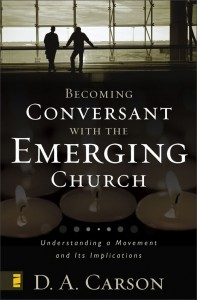Becoming Conversant with the Emerging Church
(Understanding a Movement and Its Implications)
By D.A. Carson
 For a number of years now (since about 1995), I have been studying postmodernism (a sociological cultural shift that has influenced Western thought and behavior since the 1950s-1960s), and I have known the it was just a matter of time before postmodernity made its way down through philosophy, to the Arts, to general culture, and eventually entrenched itself within the Church (any serious Francis Schaeffer student will quickly recognize his “line of despair”).
For a number of years now (since about 1995), I have been studying postmodernism (a sociological cultural shift that has influenced Western thought and behavior since the 1950s-1960s), and I have known the it was just a matter of time before postmodernity made its way down through philosophy, to the Arts, to general culture, and eventually entrenched itself within the Church (any serious Francis Schaeffer student will quickly recognize his “line of despair”).
The Death of Truth, by Dennis McCallum (general editor, www.xenos.org) and Postmodern Times by WORLD Magazine columnist, Gene Edward Veith, published by Crossway Books, are good primers for the larger context of postmodernism.
A mistake that I have seen made in some Emerging Church critiques is that some people see “emergents” as simply being a new trend or movement within church life. I think that totally misses the point. That viewpoint causes people to casually brush aside the emergents’ concerns as being arbitrarily provocative, almost as though emergents were merely trying to “get a rise” out of the older, traditional church folk.
To truly understand the movement, you have to understand the postmodern culture in which Gen-X’ers and Millennials have been immersed since their birth. Particularly for young adults who were educated in the governmental school system, they have absorbed so much postmodern influence that their very epistemological consciousness (the very way they think and process information) is postmodern. The grid through which they receive information and make decisions is postmodern, not Modern, nor Biblical. Reading books by George Barna or even books like The Last Christian Generation by Josh McDowell can help readers understand the results of this phenomenon.
In a nutshell, Postmodernism is not a movement, it is an anti-movement; a reaction against Modernism. In the same way, the Emergent Church movement is a reaction against the influences of Modernity in the culture and theology of the traditional American church. The critiques and criticisms the Emergents make of American church culture are often correct, although their solutions then towards Relativism, Universalism and Skepticism.
This issue is really immense, so instead of explaining what the Emerging Church movement is, I highly recommend this informative, balanced and well-reasoned view of this controversial issue. Dr. Carson is an amazing thinker who really tries to present a fair analysis of both sides of the debate. I know I’m putting myself in a box, but I don’t recall reading anything in Dr. Carson’s assessment that I found to be in error. That is pretty amazing for a subject this large! I have read so much shabby thinking over the past years that it is like a drink of cool water to hear a mature Christian leader like Carson who can come alongside younger thinkers (like those in the Emergent movement) and say in essence, “Now boys, you are thinking straight on some of these issues, but you are being ridiculous on others. Here is the balance.”
I also really loved his expanded vocabulary! In normal conversation he uses some great words like:
Exegencies, entomology, putative, irrefragably, patristic, insuperable, myopic, ryule, asymptotically tendentious, etc., etc.
If you only get one book on the Emergent Church issue, make sure it is this incredible title. Thank you Dr. Carson for bringing clarity to the issue for so many of us.
250 pages. On a scale of 1-5, I’d give this a 4.75 overall.
Zondervan
Copyright 2005.
ISBN-13: 978-0-310-25947-3
